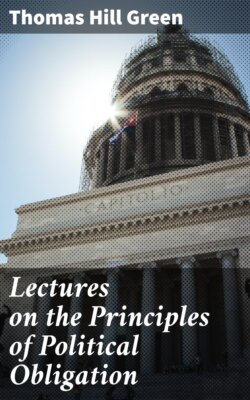Читать книгу Lectures on the Principles of Political Obligation - Thomas Hill Green - Страница 3
На сайте Литреса книга снята с продажи.
ON THE DIFFERENT SENSES OF 'FREEDOM' AS APPLIED TO WILL AND TO THE MORAL PROGRESS OF MAN.
Оглавление1. In one sense (as being search for self-satisfaction) all will is free; in another (as the satisfaction sought is or is not real) it may or may not be free
2. As applied to the inner life 'freedom' always implies a metaphor. Senses of this metaphor in Plato, the Stoics, St. Paul
3. St. Paul and Kant. It would seem that with Kant 'freedom' means merely consciousness of the possibility of it, ('knowledge of sin')
4. Hegel's conception of freedom as objectively realised in the state
5. It is true in so far as society does supply to the individual concrete interests which tend to satisfy the desire for perfection
6. Though (like the corresponding conception in St. Paul) it is not and could not be realised in any actual human society
7. In all these uses 'freedom' means, not mere self-determination or acting on preference, but a particular kind of this
8. The extension of the term from the outer to the inner relations of life, though a natural result of reflection, is apt to be misleading
9. Thus the question, Is a man free? which may be properly asked in regard to his actions, cannot be asked in the same sense in regard to his will
10. The failure to see this has led to the errors (1) of regarding motive as something apart from and acting on will, (2) of regarding will as independent of motive
11. Thus the fact that a man, being what he is, must act in a certain way, is construed into the negation of freedom
12. And to escape this negation recourse is had to the notion of an unmotived will, which is really no will at all
13. The truth is that the will is the man, and that the will cannot be rightly spoken of as 'acting on' its objects or vice versa, because they are neither anything without the other
14. If however the question be persisted in, Has a man power over his will? the answer must be both 'yes' and 'no'
15. 'Freedom' has been taken above (as by English psychologists generally) as applying to will, whatever the character of the object willed
16. If taken (as by the Stoics, St. Paul, Kant (generally), and Hegel) as applying only to good will, it must still be recognised that this particular sense implies the generic
17. Whatever the propriety of the term in the particular sense, both 'juristic' and 'spiritual' freedom spring from the same self-asserting principle in man
18. And though the former is only the beginning of full freedom, this identity of source will always justify the use of the word in the latter sense
19. But does not the conception of 'freedom' as = the moral ideal imply an untenable distinction like that of Kant between the 'pure' and 'empirical' ego?
20. The 'pure' and 'empirical' ego are one ego, regarded (1) in its possibility, (2) as at any given time it actually is
21. In man the self-realising principle is never realised; i.e. the objects of reason and will only tend to coincide
22. So far as they do coincide, man may be said to be 'free' and his will to be 'autonomous'
23. The growing organisation of human life provides a medium for the embodiment, and disciplines the natural impulses for the reception, of the idea of perfection
24. The reconciliation of reason and will takes place as the individual more and more finds his own self-satisfaction in meeting the requirements of established morality
25. Until these come to be entirely superseded by the desire of perfection for its own sake, and his will becomes really free.
